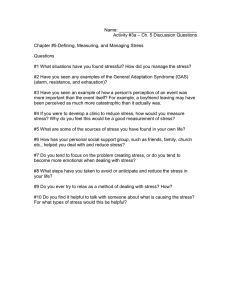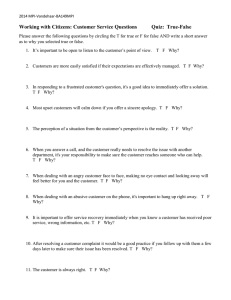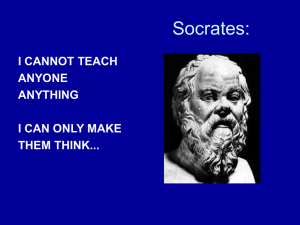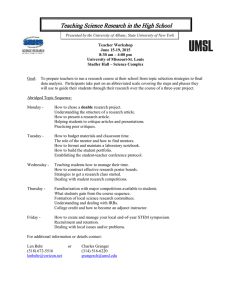Document 18025649
advertisement
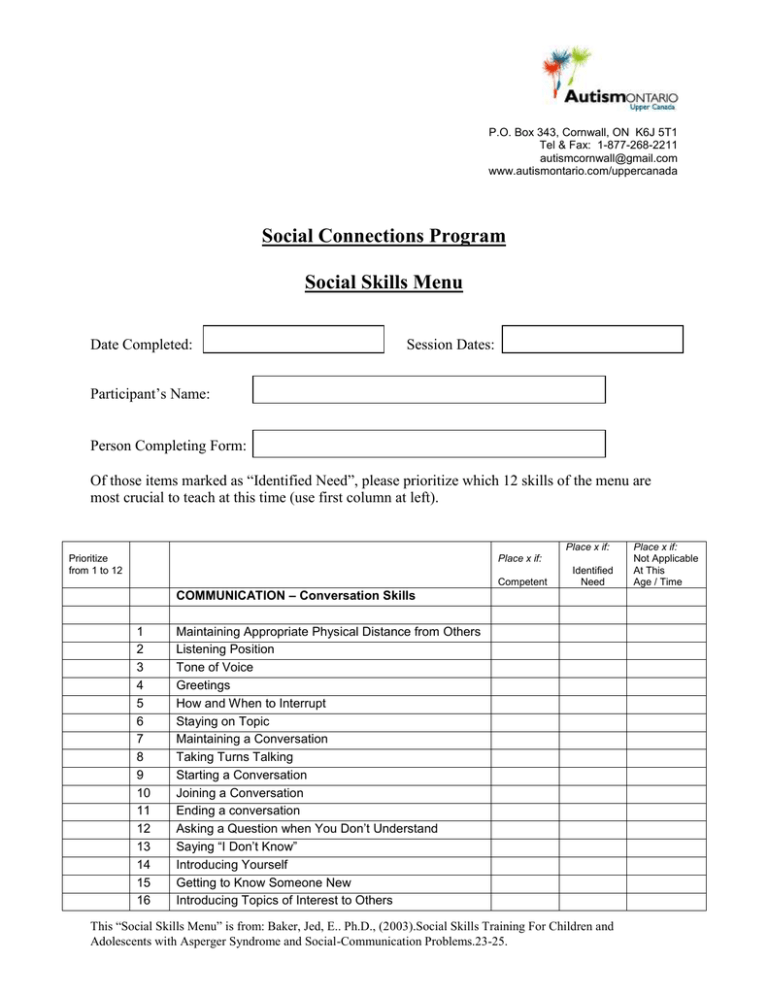
P.O. Box 343, Cornwall, ON K6J 5T1 Tel & Fax: 1-877-268-2211 autismcornwall@gmail.com www.autismontario.com/uppercanada Social Connections Program Social Skills Menu Date Completed: Session Dates: Participant’s Name: Person Completing Form: Of those items marked as “Identified Need”, please prioritize which 12 skills of the menu are most crucial to teach at this time (use first column at left). Place x if: Prioritize from 1 to 12 Place x if: Competent Identified Need COMMUNICATION – Conversation Skills 1 2 3 4 5 6 7 8 9 10 11 12 13 14 15 16 Maintaining Appropriate Physical Distance from Others Listening Position Tone of Voice Greetings How and When to Interrupt Staying on Topic Maintaining a Conversation Taking Turns Talking Starting a Conversation Joining a Conversation Ending a conversation Asking a Question when You Don’t Understand Saying “I Don’t Know” Introducing Yourself Getting to Know Someone New Introducing Topics of Interest to Others This “Social Skills Menu” is from: Baker, Jed, E.. Ph.D., (2003).Social Skills Training For Children and Adolescents with Asperger Syndrome and Social-Communication Problems.23-25. Place x if: Not Applicable At This Age / Time Competent 17 18 19 20 21 22 23 Identified Need Giving Background Information about What You Are Saying Shifting Topics Don’t Talk Too Long Sensitive Topics Complimenting Others Use Your H.E.A.D. (Happy Voice, Eye Contact, Alternating Turns, Distance) T.G.I.F. (Timing, Greeting, Initial Question, Follow-up Questions) COMMUNICATION – Co-operative Play Skills 24 25 26 27 28 29 30 31 32 Asking Someone to Play Joining Others in Play Compromising Sharing Taking Turns Playing a Game Dealing with Losing Dealing with Winning Ending a Play Activity COMMUNICATION – Friendship Management 33 34 35 36 37 38 39 40 41 42 43 44 45 46 Informal Versus Formal Behaviour Respecting Personal Boundaries Facts versus Opinions (Respecting Others’ Opinions) Sharing a Friend Getting Attention in Positive Ways Don’t be the “Rule Police” Offering Help Modesty Asking Someone Out on a Date Appropriate Touch Dealing with Peer Pressure Dealing with Rumors Calling a Friend on the Telephone Answering the Telephone EMOTIONS MANAGEMENT- Self Regulation 47 48 49 50 Recognizing Feelings Feelings Thermometer Keeping Calm Problem Solving This “Social Skills Menu” is from: Baker, Jed, E.. Ph.D., (2003).Social Skills Training For Children and Adolescents with Asperger Syndrome and Social-Communication Problems.23-25. Not Applicable At This Age / Time Competent 51 52 53 54 55 Identified Need Talking to Others When Upset Dealing with Family Problems Understanding Anger Dealing with Making a Mistake Trying Something New EMOTIONS MANAGEMENT- Empathy 56 57 58 Showing Understanding for Others’ Feelings: Preschool-Elementary Showing Understanding for Others’ Feelings: Preadolescent-Adulthood Cheering up a Friend EMOTIONS MANAGEMENT- Conflict Management 59 60 61 62 63 64 65 66 67 68 Asserting Yourself Accepting No for an Answer Dealing with Teasing – K-4th Grade Dealing with Teasing – 5th Grade and Up More Words to Deal with Teasing Dealing with Being Left Out Avoiding Being “Set Up” Giving Criticism in a Positive Way Accepting Criticism Having a Respectful Attitude This “Social Skills Menu” is from: Baker, Jed, E.. Ph.D., (2003).Social Skills Training For Children and Adolescents with Asperger Syndrome and Social-Communication Problems.23-25. Not Applicable At This Age / Time
